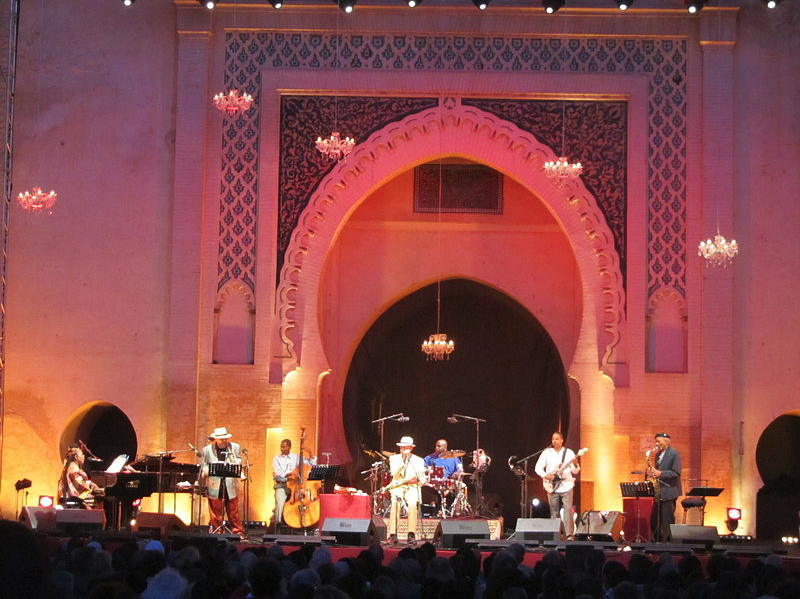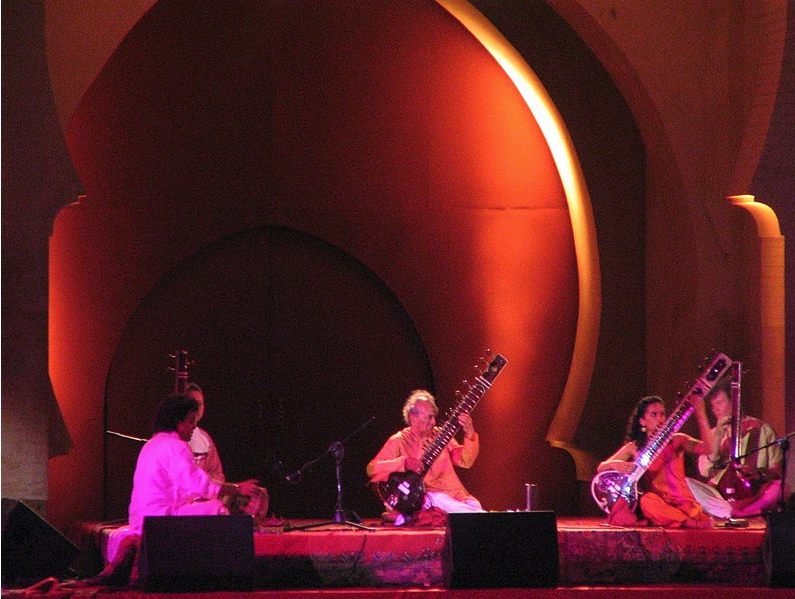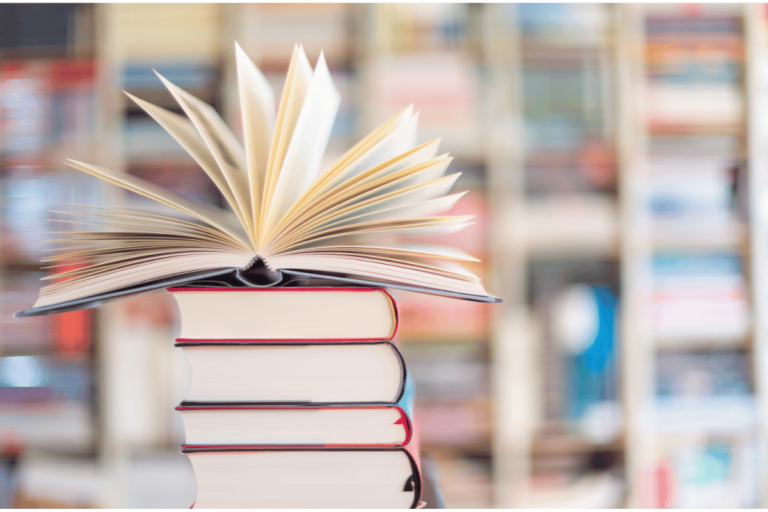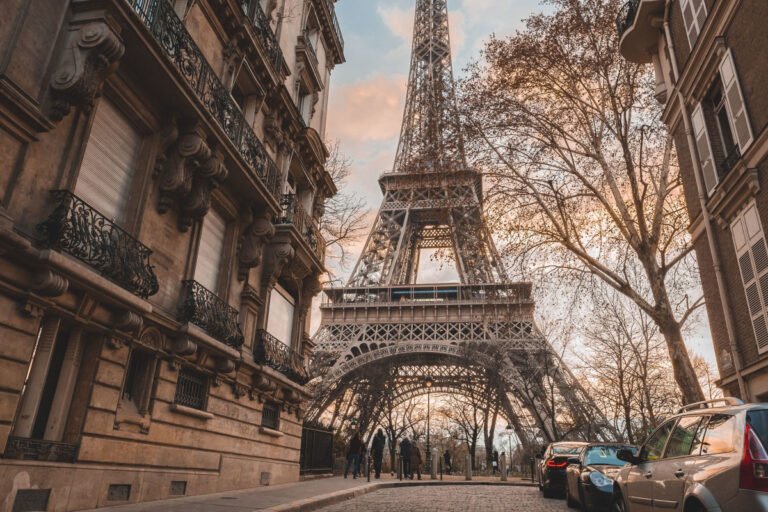Do you enjoy immersing yourself in different cultures and experiencing vibrant celebrations? If so, then you’ll be delighted to learn about the Moroccan festivals that take place around the world, allowing people from all walks of life to celebrate and honor traditional Moroccan customs.
From the enchanting Festival of World Sacred Music in Fez to the lively Moussem of Tan-Tan, these festivals provide a unique opportunity to experience the rich traditions of Morocco no matter where you are.
Picture yourself wandering through the winding streets of Fez, Morocco’s cultural capital, as melodious music fills the air. The Festival of World Sacred Music brings together musicians and artists from across the globe to celebrate their shared spiritual heritage. As you listen to mesmerizing performances by Sufi singers or watch captivating dance routines, you can feel your senses come alive with every beat and rhythm. This festival is not only a celebration of music but also an exploration of spirituality and harmony between diverse cultures. It’s an experience that will leave you feeling inspired and connected on a deeper level.
But Moroccan festivals aren’t limited to just their home country – they have found their way into major cities around the world too! London, Paris, New York – these cosmopolitan hubs have become hosts for various Moroccan festivals throughout the year. These events bring a taste of Morocco’s vibrant culture right to your doorstep. Imagine strolling through bustling markets filled with colorful textiles and aromatic spices in London’s Moroccan Market Festival or savoring delectable tagines at Paris’ International Marrakech Biennial. Whether it’s traditional music performances or art exhibitions showcasing Moroccan talent, these festivals allow individuals from all backgrounds to engage with Morocco’s rich artistic heritage.
Preserving traditions is vital for maintaining cultural diversity and fostering mutual understanding among communities worldwide. By celebrating Moroccan festivals abroad, we not only pay homage to centuries-old customs but also create spaces where people can connect with one another through shared experiences. These festivals serve as a bridge between cultures, promoting dialogue and appreciation for different ways of life. They provide an opportunity to break down barriers, challenge stereotypes, and build lasting connections.
So, whether you’re a traveler seeking new adventures or simply someone looking to immerse yourself in the beauty of Moroccan traditions, these festivals offer an enchanting journey that will stay with you long after the celebrations are over.
In this article, we will explore some of the most captivating Moroccan festivals around the world and delve into their significance. From the mystical ambiance of Fez’s Festival of World Sacred Music.
Key Takeaways
- Moroccan festivals around the world celebrate and honor traditional Moroccan customs, allowing people to experience the rich traditions of Morocco.
- These festivals serve as a bridge between cultures, promoting mutual understanding and appreciation among different communities.
- Moroccan festivals abroad break down barriers and challenge stereotypes, offering an enchanting journey and leaving a lasting impression.
- They contribute to the economic development of host countries by promoting tourism and cultural exchange, generating economic opportunities for local communities.
The Festival of World Sacred Music in Fez, Morocco
You won’t believe the mesmerizing and enchanting atmosphere of the Festival of World Sacred Music in Fez, Morocco! This annual event is held in the historic city of Fez and showcases a remarkable celebration of music from different cultures around the world. The festival not only promotes cultural heritage preservation but also fosters international cultural exchange.
Fez, known as Morocco’s cultural capital, provides the perfect backdrop for this extraordinary festival. With its stunning architecture and rich history, the city offers a unique setting for artists and musicians to come together and share their talents.
The festival takes place in various venues throughout Fez, including its famous medina, where audiences can immerse themselves in an atmosphere filled with soul-stirring melodies.
The World Sacred Music Festival aims to preserve traditional music forms that are at risk of being forgotten or lost. By bringing together artists from different countries and backgrounds, it creates a platform for them to showcase their ancestral sounds while fostering appreciation among diverse audiences. This celebration of music also plays a significant role in promoting intercultural understanding and harmony.
In addition to its cultural significance, the festival has a positive economic impact on Fez and Morocco as a whole. It attracts tourists from around the world who contribute to local businesses such as hotels, restaurants, and shops. The influx of visitors during this time boosts the economy and stimulates growth in various sectors.
Now let’s move on to another fascinating Moroccan festival – the Moussem of Tan-Tan – which showcases yet another aspect of Moroccan culture.
The Moussem of Tan-Tan
Are you ready to embark on a journey to the Moussem of Tan-Tan?
This traditional pilgrimage and cultural gathering is not to be missed.
Get ready to immerse yourself in the vibrant atmosphere as you witness the showcasing of the cultural heritage of the Sahrawi people through music, dance, and traditional costumes.
Traditional pilgrimage and cultural gathering
Attending the annual Moroccan festival in New York City, locals and tourists alike gather to experience traditional pilgrimage and immerse themselves in Moroccan culture. The festival serves as a platform for showcasing the rich cultural diversity of Morocco, with participants engaging in traditional rituals and customs that have been passed down through generations.
From the mesmerizing sound of rhythmic drumming to the vibrant colors of traditional clothing, attendees are transported to the heart of Morocco as they witness this unique celebration.
As you wander through the festival grounds, you’ll come across a lively marketplace filled with vendors selling an array of Moroccan goods. The aromas of exotic spices waft through the air as visitors explore stalls offering intricately woven rugs, beautifully handcrafted ceramics, and delicate silver jewelry. This bustling market not only provides an opportunity for attendees to purchase authentic souvenirs but also allows them to engage directly with local artisans who can share stories behind their artistry.
Additionally, one cannot miss witnessing the mesmerizing performance by skilled Gnawa musicians at the festival. Originating from North Africa, Gnawa music is characterized by its hypnotic rhythms and soulful melodies that captivate listeners. As you listen to these talented musicians play instruments such as the guembri (a three-stringed bass lute) and qraqebs (metal castanets), you can’t help but be immersed in their enchanting melodies that transport you back to ancient times.
Moreover, throughout the festival grounds, there are various workshops where attendees can participate in hands-on activities such as henna painting or calligraphy writing. These interactive sessions provide a deeper understanding of Moroccan traditions while allowing individuals to connect with local experts who patiently guide them through each step.
Transition: Moving forward from exploring the traditional pilgrimage and cultural gathering at this annual Moroccan festival, we now delve into showcasing the cultural heritage of the Sahrawi people without losing sight of their rich traditions and customs.
Showcasing the cultural heritage of the Sahrawi people
Immersing ourselves in the vibrant culture of the Sahrawi people, we discover a treasure trove of traditions and customs that have withstood the test of time.
The Sahrawi people take immense pride in their cultural preservation, ensuring that their rich heritage is passed down through generations. Despite living in diaspora, they remain deeply connected to their roots and actively engage with their community to keep their traditions alive.
One way in which the Sahrawi people showcase their cultural heritage is through various events and festivals held around the world. These gatherings serve as a platform for them to come together, celebrate their identity, and share their customs with others. Through these festivals, they not only create a sense of belonging within the diaspora but also foster understanding and appreciation among different cultures. It’s truly fascinating to witness how the Sahrawi people use these opportunities to educate others about their unique traditions while simultaneously preserving them for future generations.
As we transition into the subsequent section about ‘music, dance, and traditional costumes,’ we are captivated by how these elements play an integral role in showcasing the beauty of Sahrawi culture.
Music, dance, and traditional costumes
Exploring the vibrant culture of the Sahrawi people, we are mesmerized by the rhythmic beats and captivating melodies of their traditional music, which has been passed down through generations. Music and dance play a significant role in Sahrawi festivals, bringing communities together to celebrate their rich heritage. The Sahrawi people use various instruments such as drums, flutes, and stringed instruments to create an enchanting symphony that resonates with the soul. As the music fills the air, it sets the stage for a lively atmosphere where locals and tourists alike can immerse themselves in the joyous celebration.
In addition to their captivating music, traditional costumes also add charm and splendor to Sahrawi festivals. Adorned in colorful garments intricately embroidered with vibrant patterns and symbols, men and women showcase their cultural pride through their attire. Each garment tells a story, representing aspects of Sahrawi history and traditions. From flowing robes adorned with intricate beadwork to elaborate headdresses decorated with feathers and jewels, these costumes truly capture the essence of Sahrawi heritage.
Transitioning into our next section on Moroccan festivals in London, Paris, and New York City; let’s explore how these celebrations bring a taste of Moroccan culture to different parts of the world without losing their authentic essence.
Moroccan festivals in London, Paris, and New York
In London, Paris, and New York, you can feel the electric atmosphere as Moroccan festivals transport you to vibrant markets filled with colorful spices and traditional music.
These cities are not only home to a large number of Moroccans but also attract visitors from all over the world who come to experience the rich culture and traditions of Morocco. Moroccan festivals in these cosmopolitan hubs serve as cultural exchanges, allowing people of different backgrounds to come together and celebrate the beauty of Moroccan heritage.
London, with its diverse population, hosts several Moroccan festivals throughout the year. From the bustling streets of Edgware Road to the vibrant festivities in Trafalgar Square during Eid al-Fitr, London offers a taste of Morocco right at your doorstep. With traditional music performances, mouthwatering food stalls serving tagine and couscous, and colorful parades showcasing authentic costumes, these events truly bring a piece of Morocco to this bustling metropolis.
Similarly, Paris is known for its love affair with art and culture, making it an ideal setting for celebrating Moroccan traditions abroad. The annual Tanjazz festival held in various venues across Paris brings together renowned Moroccan musicians alongside local talent. Visitors can immerse themselves in a fusion of jazz rhythms infused with traditional Moroccan sounds while enjoying breathtaking views of iconic landmarks such as the Eiffel Tower or Montmartre. The festival creates an unforgettable experience that celebrates both diversity and artistic expression.
New York City is another melting pot where Moroccan festivals thrive. Each year during Ramadan, Manhattan’s Madison Square Park transforms into a lively bazaar filled with vendors selling handmade crafts, aromatic spices, and delicious street food reminiscent of Marrakech’s famous Jemaa el-Fna square. Visitors can join in on traditional dances like the Aïta or watch mesmerizing belly dance performances that showcase Morocco’s rich cultural heritage.
As we delve into exploring why celebrating traditions is important in preserving our cultural identity, we must acknowledge how Moroccan festivals in London, Paris, and New York play a crucial role. They not only provide a sense of nostalgia for Moroccans living abroad but also introduce people from different backgrounds to the beauty and richness of Moroccan culture. These festivals serve as a reminder that no matter where we are in the world, our traditions shape who we are and should be celebrated and preserved for generations to come.
Importance of preserving and celebrating traditions
Preserving and celebrating our cultural traditions is like holding onto a fragrant bouquet of memories, a vibrant tapestry that weaves together the threads of our identity.
In a world that’s constantly evolving, it becomes crucial to safeguard and pass down the customs and rituals that define us as Moroccans. These traditions hold immense cultural significance, acting as a bridge between generations and connecting us to our roots. By preserving them, we honor the rich heritage of Morocco and ensure that future generations can bask in the beauty of our unique customs.
The importance of preserving traditions lies in their ability to create a sense of belonging and unity among Moroccans living abroad. These festivals provide an opportunity for individuals to come together and celebrate their shared culture. They serve as reminders of who we are and where we come from, instilling pride within us all. Whether it’s gathering for traditional Moroccan music performances or indulging in delectable culinary delights, these festivities allow us to immerse ourselves in our cultural heritage.
Moreover, preserving traditions helps us maintain a strong connection with our ancestors. Through these celebrations, we carry forward age-old practices that have been passed down through countless generations. We pay homage to those who came before us by keeping their customs alive. It is through this preservation that we ensure their stories are not forgotten but continue to be told for years to come.
Preserving and celebrating Moroccan traditions is essential for maintaining our cultural identity and fostering a sense of community among Moroccans worldwide. The significance lies not only in honoring our past but also in creating opportunities for future generations to experience the richness of our heritage.
As we delve into the impact of Moroccan festivals around the world, let’s explore how these celebrations bring people together across borders while leaving an indelible mark on diverse cultures globally. These festivals not only showcase the vibrant traditions, music, and art of Morocco but also foster cultural exchange and understanding among different communities, fostering a sense of unity and appreciation for our shared humanity.
Impact of Moroccan festivals around the world
Moroccan festivals around the world have a significant impact on various aspects. Firstly, they promote tourism and cultural exchange as people from different backgrounds come together to experience the rich Moroccan traditions.
Secondly, these festivals generate economic opportunities by attracting visitors who contribute to the local economy through accommodation, food, and souvenir purchases.
Lastly, these events foster a sense of pride and identity in the Moroccan diaspora, allowing them to reconnect with their roots and showcase their heritage on an international stage.
Promoting tourism and cultural exchange
Experience the vibrant atmosphere and immerse yourself in the rich traditions of Moroccan festivals around the world, promoting tourism and cultural exchange.
Moroccan festivals have a unique way of attracting tourists from all corners of the globe, thanks to their colorful celebrations and captivating performances. Whether it’s the mesmerizing music, intricate traditional costumes, or mouth-watering cuisine, these festivals offer an immersive experience that allows visitors to truly connect with Moroccan culture.
- Witness the energetic dance routines that’ll make you want to join in and let loose.
- Indulge in delicious Moroccan dishes bursting with flavors that’ll transport your taste buds to a different world.
- Engage in lively conversations with locals who’re passionate about sharing their customs and traditions.
By participating in these festivals abroad, not only do tourists benefit from a memorable experience, but they also contribute to cultural exchange opportunities. They get a chance to learn about Morocco’s rich heritage firsthand through interactions with locals. This cultural exchange fosters understanding and appreciation for different cultures, breaking down barriers and building bridges between communities.
Moreover, as tourists share their experiences with friends and family back home, they become ambassadors for Moroccan culture, generating curiosity and interest in visiting this enchanting country themselves. So step into the world of Moroccan festivals abroad and discover how they generate economic opportunities for local communities while preserving centuries-old traditions.
Generating economic opportunities
Get ready to explore the economic benefits that these festivals bring to local communities. Moroccan festivals around the world not only celebrate traditions but also contribute to the economic development of the host countries.
These events attract a large number of tourists, both from within and outside the Moroccan diaspora, which results in increased revenue for local businesses such as hotels, restaurants, and shops. The influx of visitors stimulates job creation and boosts various sectors of the economy.
In addition to generating income, these festivals also foster cultural integration. As people from different backgrounds come together to celebrate Moroccan traditions, they have an opportunity to learn about and appreciate a rich culture that isn’t their own. This exchange of knowledge and experiences helps build bridges between communities and promotes understanding among diverse groups of people. Moreover, it creates a sense of unity and belonging for those who are part of the Moroccan diaspora living abroad.
With its positive impact on local economies and cultural integration, it’s no wonder that these festivals are highly anticipated by both Moroccans living abroad and locals in host countries. By fostering a sense of pride and identity in the Moroccan diaspora while promoting cross-cultural understanding, these celebrations truly transcend borders.
Fostering a sense of pride and identity in the Moroccan diaspora
Immerse yourself in the vibrant cultural traditions and find a sense of pride and identity within the global Moroccan diaspora.
As Moroccans settle in different parts of the world, they strive to preserve their rich cultural heritage while adapting to new environments. One way they achieve this is through celebrating Moroccan festivals, which serve as a powerful reminder of their roots and help strengthen community bonds.
These festivals bring together Moroccans from various backgrounds, allowing them to connect with each other and share their customs, music, dance, and cuisine.
Participating in these festivals fosters a deep sense of pride among the Moroccan diaspora as they showcase their unique traditions to the world. It becomes an opportunity for Moroccans abroad to proudly display their heritage while also educating others about Morocco’s diverse culture. The vibrant colors, rhythmic music, and lively dances create an atmosphere that transports participants back home, evoking nostalgia and a strong connection to their Moroccan identity.
Through these festivities, members of the Moroccan diaspora come together as a community. They support one another, share stories and experiences, and feel a sense of belonging that transcends geographical boundaries. This sense of unity strengthens community bonds among Moroccans living abroad who may face challenges such as language barriers or cultural differences in their host countries.
Attending these festivals not only allows individuals to celebrate their own heritage but also provides an opportunity for intercultural exchange between communities. Non-Moroccan attendees can learn about Morocco’s diverse traditions firsthand, fostering mutual understanding and appreciation for different cultures.
By preserving cultural heritage and strengthening community bonds through vibrant Moroccan festivals around the world, Moroccans in the diaspora find a profound sense of pride and identity. These celebrations serve as a platform for sharing traditions with others while creating a supportive network within the global Moroccan community.
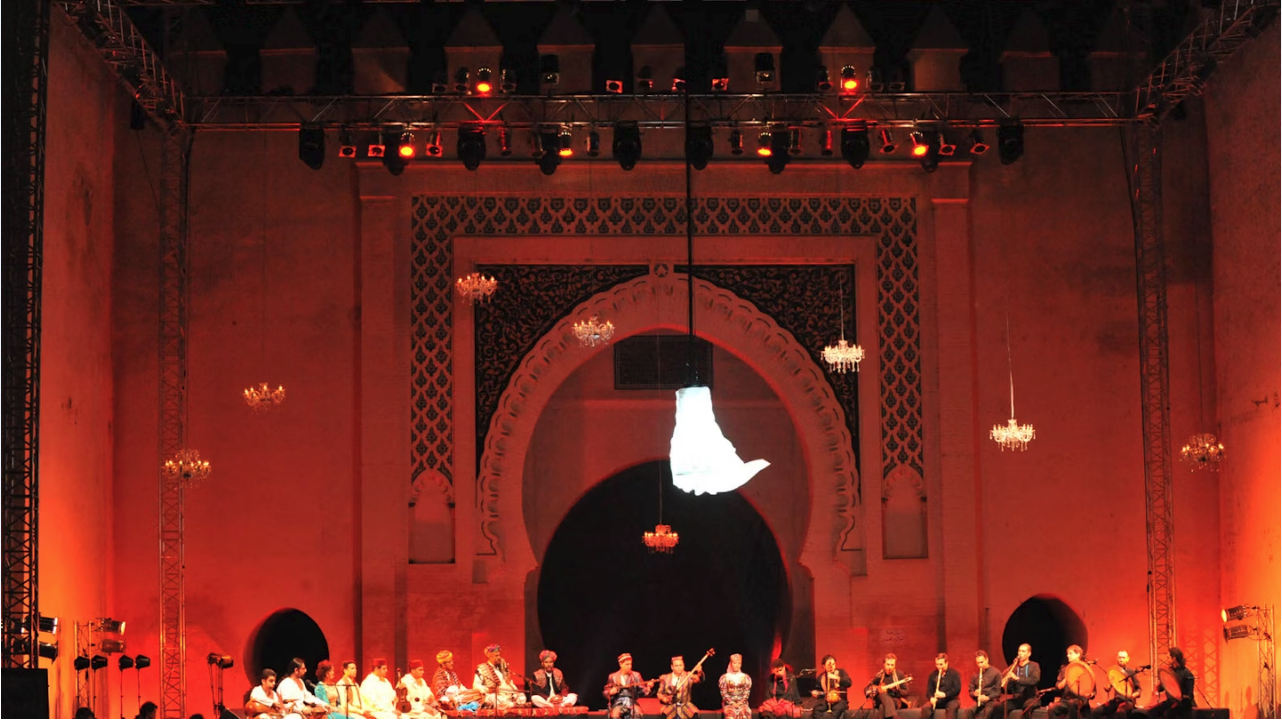
Frequently Asked Questions
What is the history and significance of the Festival of World Sacred Music in Fez, Morocco?
The Festival of World Sacred Music in Fez, Morocco has a rich history and cultural significance. It was first held in 1994 and attracts musicians from around the globe to celebrate diverse spiritual traditions.
Can you provide some details about the Moussem of Tan-Tan and its cultural significance?
The Moussem of Tan-Tan is a cultural heritage event with deep significance for the Moroccan diaspora. It showcases traditional music, dance, and crafts, allowing participants to reconnect with their roots and preserve their cultural identity.
What are some popular Moroccan festivals celebrated in London, Paris, and New York?
Step into a cultural extravaganza as Moroccan festivals weave their magic in London, Paris, and New York. These vibrant celebrations explore the influence of Moroccan traditions on local communities, creating an immersive experience that transports you to the heart of Morocco.
Why is it important to preserve and celebrate Moroccan traditions abroad?
Preserving and celebrating Moroccan traditions abroad is important for several reasons. It benefits cultural identity by maintaining customs, values, and beliefs. It also fosters a sense of belonging and connection among the Moroccan diaspora, keeping their heritage alive.
How do Moroccan festivals impact local communities and promote cultural exchange around the world?
Moroccan festivals not only bring joy and excitement to local communities, but they also attract tourists from all over the world. The cultural exchange benefits are immense, as people get to immerse themselves in Moroccan traditions and experience a different way of life.
Conclusion
So you’ve heard about all the amazing Moroccan festivals celebrated around the world, and it’s clear that these events have a significant impact.
The Festival of World Sacred Music in Fez brings together musicians from different cultures, promoting unity and understanding through the power of music.
The Moussem of Tan-Tan showcases traditional Bedouin culture, reminding us of the importance of preserving our heritage.
But here’s the ironic twist – while these festivals celebrate Moroccan traditions abroad, they also highlight how far we’ve come from our roots.
It’s incredible to see Moroccan festivals being held in London, Paris, and New York, but it also begs the question: Have we lost touch with our traditions at home?
These festivals serve as a reminder that traditions should not be forgotten or diminished. They provide an opportunity for Moroccans living overseas to reconnect with their cultural identity and share it with others.
But let’s not forget that celebrating traditions is not just about putting on a show for tourists – it should be a continuous effort to preserve and pass down our rich heritage to future generations.
In conclusion, Moroccan festivals around the world are not only vibrant celebrations of culture but also serve as a wake-up call for us to reevaluate our relationship with tradition at home.
While it may seem ironic that these festivities thrive abroad while some aspects are fading back in Morocco itself, they ultimately remind us of the beauty and significance of preserving our customs.
So let’s continue cherishing and celebrating our traditions both near and far, ensuring they remain alive for generations to come.

The Editorial Team is a passionate group of Morocco enthusiasts dedicated to sharing the beauty, culture, and wonders of this captivating country. With diverse backgrounds and a deep love for travel, we strive to bring you engaging and informative content that inspires your Moroccan adventures. From uncovering hidden gems and sharing local insights to exploring mouthwatering cuisine and showcasing the vibrant lifestyle, our team is committed to providing you with valuable resources and exciting stories that enhance your exploration of Morocco. Join us on this journey as we celebrate the rich heritage and unforgettable experiences that make Morocco truly special.

